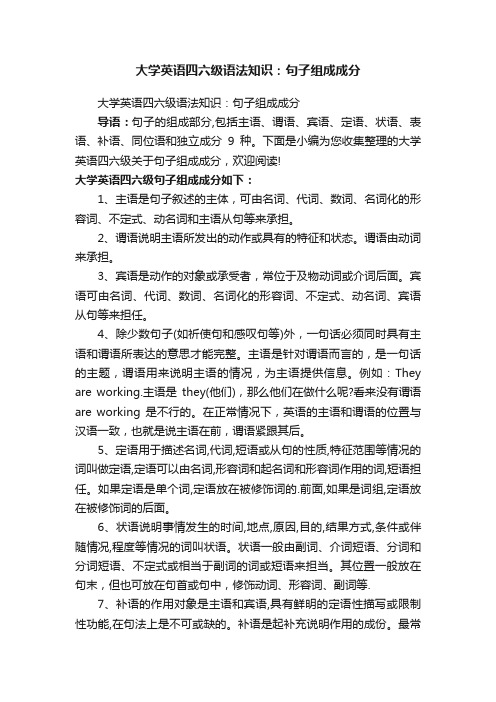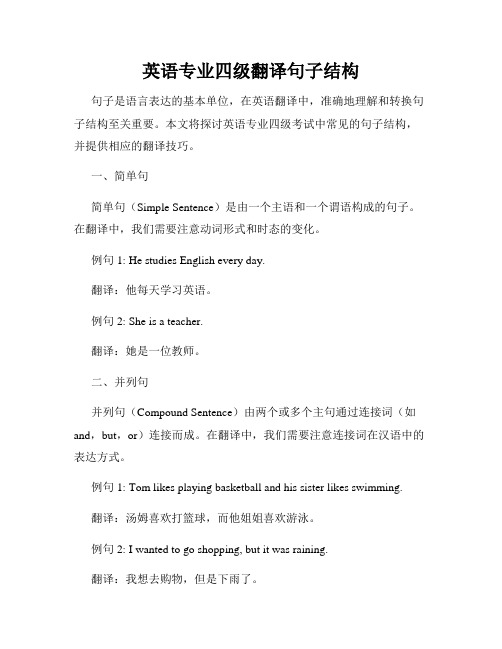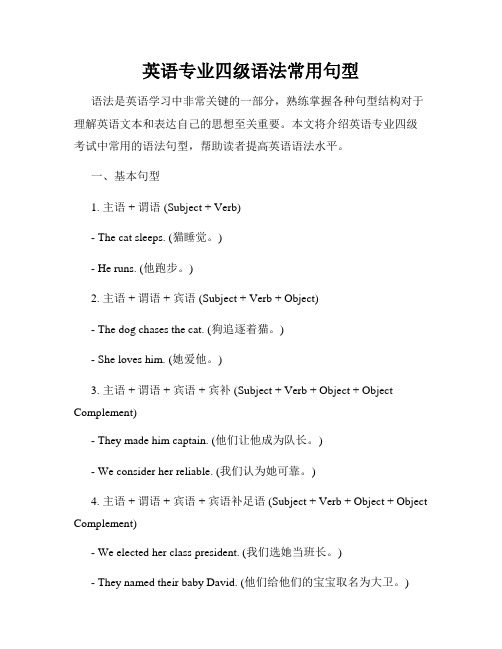英语专四语法之句子成分
英语专四语法之句子成分

英语专四语法句子成分(必须的成分:主语和谓语。
可能有的成分:宾语、补语、修饰语「定语、状语、同位语」)主语(1)主语(Subject)一般在句子开头,是句子的“陈述对象”,通常由名词、代词、不定式、动名词、相当于名词的词组或从句、引用充当。
如:The students all love their English teacher.这些学生都喜爱他们的英语老师。
They go to school by bus.他们乘公共汽车上学。
Watching TV too much is bad for your eyes.看太多电视对你的眼睛是有害的。
What we need is a good rest.我们需要的是好好休息一下。
“I love you”is often heard on Valentine's Day.情人节时,经常听到有人说“我爱你”。
(2)形式主语与真实主语(Formal Subject and Real Subject)主语是不定式短语、动名词短语或分句时,常会放在句尾,用it代替它原来的位置,这个it 称为形式主语,放在句尾的原主语为真实主语。
如:It is very hard to get to sleep.入睡很难。
(不定式短语为真实主语,it为形式主语。
)It's a pity that you can't come.你不能来真是件遗憾的事。
(句子为真实主语,it为形式主语。
)谓语全部倒装和部分倒装:如果谓语在主语前面, 就是倒装语序. 倒装语序又分为全部倒装和部分倒装. 在全部倒装的句子中, 整个谓语都放在主语的前面:Here are some registered letters for you.In came a man with a white beard.在部分倒装的句子中只是谓语中的一部分(如助动词, 情态动词, 或系动词be等)放在主语前面, 其余部分仍在主语后面:Under no circumstances must a soldier leave his post.I couldn’t answer the question. Nor could anyone else in our class.Only in this way is it possible to accomplish the above-mentioned glorious task.以neither, nor, so等开始的句子: 由so引起的表示前面所说情况也适用于另一人(或东西)的句子(肯定句), 由neither, nor引起的表示前面所说情况也适用于另一人(或东西)的句子(否定句), 助动词或be置于主语前.“We must start for the work-site now”. “ So must we.”I am quite willing to help and so are the others.He didn’t drop any hint. Nor (Neither) did his secretary.“I won’t do such a thing.” “Nor (Neither) will I.”如果一个句子只是重复前面一句话的意思, 尽管是用so开头, 语序也不要颠倒.“It was cold yesterday.” “So it was.”“Tomorrow will be Monday.” “So it will.”当句首状语为never, little, not only, not until, hardly, scarcely等否定词或有否定意义的词语时, 一般引起部分倒装.No longer are they staying with us.No sooner had he arrived there than he fell ill.Under no circumstances could I agree to such a principle.表示位置或方向的副词提前, 谓语动词为go, come等表示位置转移的动作动词而主语又较长时, 通常用全部倒装:There was a sudden gust of wind and away went his hat.The door burst open and I rushed the crowd.There comes the bus!Now comes your turn.1.如果主语是代词, 仍用正常语序:There comes your turn.有here引起, 谓语为be的句子, 也要倒装:Here is China’s largest tropical forest.Here are some picture-books.2.如果主语是代词, 仍用正常语序:Here we are. This is the new railway station.“Give me some paper.” “Here you are.”3.表语和系动词提前:介词短语: On the other side was northern Xinjiang.Near the southern end of the village was a large pear orchard.形容词: Very important in the farmer’s life is the radio weather report.Worst of all were the humiliations he suffered.副词: Below is a restaurant.Southwest of the reservoir were 2,000 acres of sandy wasteland.分词: Housed in the Cultural Palace are a library, an auditorium and recreation rooms.Hidden underground is a wealth of gold, silver, copper, lead and zink.Lying on the floor was a boy aged about 17.Standing beside the table was an interpreter.6) 句首状语若由only + 副词, only + 介词词组, only + 状语从句构成, 引起局部倒装:Only yesterday did he find out that his watch was missing.Only through sheer luck did he manage to get some tickets.Only because there were some cancelled bookings did he get some tickets in the end.有not only开头的句子或分句, 往往引起局部倒装:Not only did he complain about the food, he also refused to pay for it.Not only did the garage overcharge me, but they hadn’t done a very good repair job either.宾语(1)宾语(Object)是行为动词的对象,一般可分为动词宾语和介词宾语,充当宾语的可以是名词、代词、名词化的形容词、动名词、动词不定式、介词短语或句子。
英语语法之句子成分

一、句子成分(一)句子成分的定义:构成句子的各个部分叫做句子成分。
句子成分有主要成分和次要成分;主要成分有主语和谓语;次要成分有表语、宾语、定语、状语、补足语和同位语。
句子成分详解表(二)主语:主语(Subject)是一个句子所叙述的主体,一般位于句首。
但在there be结构、疑问句(当主语不疑问词时)和倒装句中,主语位于谓语、助动词或情态动词后面。
主语可由名词、代词、数词、不定式、动名词、名词化的形容词和主语从句等表示。
例如:1. During the 1990s, American country music has become more and more popular. ()2. We often speak English in class. ()3. One-third of the students in this class are girls. ()4. To swim in the river is a great pleasure. ()5. Smoking does harm to the health. ()6. The rich should help the poor. ()7. When we are going to have an English test has not been decided. ()8. It is necessary to master a foreign language. ()趁热打铁一.改错:1. Do exercise is good for your health.2. Eat much meat is bad for your health.二.指出下列句中主语的中心词:The teacher with two of his students is walking into the classroom.三.找出下面句子的主语:1. It is a pleasure to talk to you.2. Cleaning the house needs a lot of time.(三)谓语谓语(Predicate) 说明主语是什么,做什么或怎么样,由动词充当。
英语句子成分详解方法精选全文完整版

可编辑修改精选全文完整版英语句子成分一、英语句子的成分组成句子的各个部分叫作句子的成分。
句子成分主要包括主语、谓语、宾语、表语、宾语补足语、定语和状语。
主语和谓语是句子的主体部分。
1)主语subject主语是一个句子的主体,是全句叙述的对象,是句子要说明的人或事物,即表示句子所说的“是什么”或“是谁”,常由名词、代词、动名词或动词不定式等担任,一般位于句首。
The girl can sing many English songs.We are students. / This is my pen. Yours is on the desk.The blind need more help.To speak loudly in public is not polite.Smoking is bad for your health.2)谓语predicate谓语是对主语加以陈述,表示主语的动作或状态,常由动词担任,一般位于主语之后。
谓语有时态和语态的变化,且要和主语在人称和数上保持一致。
I love you. You hate me. You hurt my heart.I have an English-Chinese dictionary. He has one too.We can play the piano.She is talking with her sister. / I have seen this man before.3)宾语object宾语是谓语动词所涉及的对象,是谓语动词所表示动作的对象或承受者。
常由名词、代词、动名词或动词不定式等担任,一般位于谓语动词(及物动词)或介词之后。
He is doing his homework. / I saw a plane in the sky just now.They did nothing this morning. / I met him on my way home.She wants to go home.We enjoy playing football.【注意】:某些及物动词之后要求有双宾语,即直接宾语和间接宾语,直接宾语指物,间接宾语指人。
英语句子成分知识点

英语句子成分知识点一、句子成分的定义与基本概念。
1. 主语(Subject)- 主语是句子陈述的对象,表示句子说的是“什么人”或“什么事”。
一般由名词、代词、数词、动名词、不定式或从句等充当。
- 例如:- Tom likes reading.(“Tom”是名词作主语,表示动作“likes”的执行者)- She is a good student.(“She”是代词作主语)- Three is a lucky number.(“Three”是数词作主语)- Reading books is my hobby.(“Reading books”是动名词短语作主语)- To see is to believe.(“To see”是不定式作主语)- What he said made me angry.(“What he said”是从句作主语)2. 谓语(Predicate)- 谓语说明主语所做的动作或具有的特征和状态。
由动词充当,在不同的时态和语态下有不同的形式。
- 例如:- He runs every day.(“runs”是动词的一般现在时形式,作谓语,表示主语“He”的动作)- They were watching TV at that time.(“were watching”是动词的过去进行时形式,作谓语)- The window was broken by the boy.(“was broken”是动词的一般过去时的被动语态形式,作谓语)3. 宾语(Object)- 宾语表示动作的对象或承受者,一般位于及物动词或介词后面。
可由名词、代词、数词、动名词、不定式或从句等充当。
- 例如:- I love apples.(“apples”是名词作宾语,是动作“love”的对象)- She gave him a book.(“him”是代词作间接宾语,“a book”是名词作直接宾语)- He wants to drink some water.(“to drink some water”是不定式短语作宾语)- They are talking about how to solve the problem.(“how to solve the problem”是从句作介词“about”的宾语)4. 表语(Predicative)- 表语是用来说明主语的身份、性质、特征和状态的,常位于系动词(be, become, get, look, seem等)之后。
大学英语四六级语法知识:句子组成成分

大学英语四六级语法知识:句子组成成分大学英语四六级语法知识:句子组成成分导语:句子的组成部分,包括主语、谓语、宾语、定语、状语、表语、补语、同位语和独立成分9种。
下面是小编为您收集整理的大学英语四六级关于句子组成成分,欢迎阅读!大学英语四六级句子组成成分如下:1、主语是句子叙述的主体,可由名词、代词、数词、名词化的形容词、不定式、动名词和主语从句等来承担。
2、谓语说明主语所发出的动作或具有的特征和状态。
谓语由动词来承担。
3、宾语是动作的对象或承受者,常位于及物动词或介词后面。
宾语可由名词、代词、数词、名词化的形容词、不定式、动名词、宾语从句等来担任。
4、除少数句子(如祈使句和感叹句等)外,一句话必须同时具有主语和谓语所表达的意思才能完整。
主语是针对谓语而言的,是一句话的主题,谓语用来说明主语的情况,为主语提供信息。
例如:They are working.主语是they(他们),那么他们在做什么呢?看来没有谓语are working 是不行的。
在正常情况下,英语的主语和谓语的位置与汉语一致,也就是说主语在前,谓语紧跟其后。
5、定语用于描述名词,代词,短语或从句的性质,特征范围等情况的词叫做定语,定语可以由名词,形容词和起名词和形容词作用的词,短语担任。
如果定语是单个词,定语放在被修饰词的.前面,如果是词组,定语放在被修饰词的后面。
6、状语说明事情发生的时间,地点,原因,目的,结果方式,条件或伴随情况,程度等情况的词叫状语。
状语一般由副词、介词短语、分词和分词短语、不定式或相当于副词的词或短语来担当。
其位置一般放在句末,但也可放在句首或句中,修饰动词、形容词、副词等.7、补语的作用对象是主语和宾语,具有鲜明的定语性描写或限制性功能,在句法上是不可或缺的。
补语是起补充说明作用的成份。
最常见的是宾语补足语。
名词、动名词、形容词、副词、不定式、现在分词、过去分词都可以在句子中作宾补。
8、表语是用来说明主语的性质,身份,特征和状态。
英语四级复习之句子成分介绍

英语四级复习之句子成分介绍
来源:文都图书
英语中的句子是由主语部分和谓语部分组成的。
具体来讲,明确了句子成分,可以帮助大家更好地理解语法、分析句子,对提高英语四级综合能力和整体成绩,都有很大的帮助。
那么,下面就来介绍一下英语四级主要考查的句子成分。
英语四级主要考查下列六中句子成分:
1.主语(subject)它是句子所要说明的人或事物,是一句的主体。
如I study English(我学习英语)中的I。
2.谓语动词(predicate verb)它是说明主语的动作或状态的,如I study English中的study。
3.表语(predicative)它是放在连系动词之后表示主语的身分或特征的,如I am a student(我是一个学生)中的student。
4.宾语(object)它是表示及物动词动作的对象的,如I study English中的English。
介词后面的名词或代词,叫做介词的宾语,如They don't work on Sunday(他们星期天不工作)中的Sunday,就是介词on的宾语。
5.定语(attribute)它是限定或修饰名词或代词用的,如He likes to drink co1d milk(他喜欢喝冷牛奶)中的co1d。
6.状语(adverbial)它是修饰动词、形容词、副词用的,如He works hard(他努力工作)中的hard。
对于句子成分的深入了解,还需要做适当的题量。
2015
《大学英语四级考试真题精析与标准预测》,相信可以帮助更深入系统的学习。
英语专业四级翻译句子结构

英语专业四级翻译句子结构句子是语言表达的基本单位,在英语翻译中,准确地理解和转换句子结构至关重要。
本文将探讨英语专业四级考试中常见的句子结构,并提供相应的翻译技巧。
一、简单句简单句(Simple Sentence)是由一个主语和一个谓语构成的句子。
在翻译中,我们需要注意动词形式和时态的变化。
例句1: He studies English every day.翻译:他每天学习英语。
例句2: She is a teacher.翻译:她是一位教师。
二、并列句并列句(Compound Sentence)由两个或多个主句通过连接词(如and,but,or)连接而成。
在翻译中,我们需要注意连接词在汉语中的表达方式。
例句1: Tom likes playing basketball and his sister likes swimming.翻译:汤姆喜欢打篮球,而他姐姐喜欢游泳。
例句2: I wanted to go shopping, but it was raining.翻译:我想去购物,但是下雨了。
三、复合句复合句(Complex Sentence)是包含一个主句和一个或多个从句的句子。
从句可以是名词从句、形容词从句或者副词从句。
在翻译中,我们需要根据从句的类型选择合适的翻译方法。
1. 名词从句名词从句(Noun Clause)在句子中担任名词的成分。
常见的引导词有that,whether和疑问词(如who,what,when,where,why)。
例句1: She asked if I could help her.翻译:她问我能否帮助她。
例句2: I don't know where he went.翻译:我不知道他去哪里了。
2. 形容词从句形容词从句(Adjective Clause)在句子中担任形容词的成分,修饰名词或代词。
常见的引导词有that,which,who,whom,whose。
英语专业四级语法常用句型

英语专业四级语法常用句型语法是英语学习中非常关键的一部分,熟练掌握各种句型结构对于理解英语文本和表达自己的思想至关重要。
本文将介绍英语专业四级考试中常用的语法句型,帮助读者提高英语语法水平。
一、基本句型1. 主语 + 谓语 (Subject + Verb)- The cat sleeps. (猫睡觉。
)- He runs. (他跑步。
)2. 主语 + 谓语 + 宾语 (Subject + Verb + Object)- The dog chases the cat. (狗追逐着猫。
)- She loves him. (她爱他。
)3. 主语 + 谓语 + 宾语 + 宾补 (Subject + Verb + Object + Object Complement)- They made him captain. (他们让他成为队长。
)- We consider her reliable. (我们认为她可靠。
)4. 主语 + 谓语 + 宾语 + 宾语补足语 (Subject + Verb + Object + Object Complement)- We elected her class president. (我们选她当班长。
)- They named their baby David. (他们给他们的宝宝取名为大卫。
)1. 主语 + 谓语 + 宾语从句 (Subject + Verb + Object Clause)- I know that he is coming. (我知道他来了。
)- She believes what he says. (她相信他说的话。
)2. 主语 + 谓语 + 宾语 + 宾语补足从句 (Subject + Verb + Object + Object Complement Clause)- They made him realize that he was wrong. (他们使他意识到他错了。
- 1、下载文档前请自行甄别文档内容的完整性,平台不提供额外的编辑、内容补充、找答案等附加服务。
- 2、"仅部分预览"的文档,不可在线预览部分如存在完整性等问题,可反馈申请退款(可完整预览的文档不适用该条件!)。
- 3、如文档侵犯您的权益,请联系客服反馈,我们会尽快为您处理(人工客服工作时间:9:00-18:30)。
英语专四语法句子成分(必须的成分:主语和谓语。
可能有的成分:宾语、补语、修饰语「定语、状语、同位语」)主语(1)主语(Subject)一般在句子开头,是句子的“陈述对象”,通常由名词、代词、不定式、动名词、相当于名词的词组或从句、引用充当。
如:The students all love their English teacher.这些学生都喜爱他们的英语老师。
They go to school by bus.他们乘公共汽车上学。
Watching TV too much is bad for your eyes.看太多电视对你的眼睛是有害的。
What we need is a good rest.我们需要的是好好休息一下。
“I love you”is often heard on Valentine's Day.情人节时,经常听到有人说“我爱你”。
(2)形式主语与真实主语(Formal Subject and Real Subject)主语是不定式短语、动名词短语或分句时,常会放在句尾,用it代替它原来的位置,这个it 称为形式主语,放在句尾的原主语为真实主语。
如:It is very hard to get to sleep.入睡很难。
(不定式短语为真实主语,it为形式主语。
)It's a pity that you can't come.你不能来真是件遗憾的事。
(句子为真实主语,it为形式主语。
)谓语全部倒装和部分倒装:如果谓语在主语前面, 就是倒装语序. 倒装语序又分为全部倒装和部分倒装. 在全部倒装的句子中, 整个谓语都放在主语的前面:Here are some registered letters for you.In came a man with a white beard.在部分倒装的句子中只是谓语中的一部分(如助动词, 情态动词, 或系动词be等)放在主语前面, 其余部分仍在主语后面:Under no circumstances must a soldier leave his post.I couldn’t answer the question. Nor could anyone else in our class.Only in this way is it possible to accomplish the above-mentioned glorious task.以neither, nor, so等开始的句子: 由so引起的表示前面所说情况也适用于另一人(或东西)的句子(肯定句), 由neither, nor引起的表示前面所说情况也适用于另一人(或东西)的句子(否定句), 助动词或be置于主语前.“We must start for the work-site now”. “ So must we.”I am quite willing to help and so are the others.He didn’t drop any hint. Nor (Neither) did his secretary.“I won’t do such a thing.” “Nor (Neither) will I.”如果一个句子只是重复前面一句话的意思, 尽管是用so开头, 语序也不要颠倒.“It was cold yesterday.” “So it was.”“Tomorrow will be Monday.” “So it will.”当句首状语为never, little, not only, not until, hardly, scarcely等否定词或有否定意义的词语时, 一般引起部分倒装.No longer are they staying with us.No sooner had he arrived there than he fell ill.Under no circumstances could I agree to such a principle.表示位置或方向的副词提前, 谓语动词为go, come等表示位置转移的动作动词而主语又较长时, 通常用全部倒装:There was a sudden gust of wind and away went his hat.The door burst open and I rushed the crowd.There comes the bus!Now comes your turn.1.如果主语是代词, 仍用正常语序:There comes your turn.有here引起, 谓语为be的句子, 也要倒装:Here is China’s largest tropical forest.Here are some picture-books.2.如果主语是代词, 仍用正常语序:Here we are. This is the new railway station.“Give me some paper.” “Here you are.”3.表语和系动词提前:介词短语: On the other side was northern Xinjiang.Near the southern end of the village was a large pear orchard.形容词: Very important in the farmer’s life is the radio weather report.Worst of all were the humiliations he suffered.副词: Below is a restaurant.Southwest of the reservoir were 2,000 acres of sandy wasteland.分词: Housed in the Cultural Palace are a library, an auditorium and recreation rooms.Hidden underground is a wealth of gold, silver, copper, lead and zink.Lying on the floor was a boy aged about 17.Standing beside the table was an interpreter.6) 句首状语若由only + 副词, only + 介词词组, only + 状语从句构成, 引起局部倒装:Only yesterday did he find out that his watch was missing.Only through sheer luck did he manage to get some tickets.Only because there were some cancelled bookings did he get some tickets in the end.有not only开头的句子或分句, 往往引起局部倒装:Not only did he complain about the food, he also refused to pay for it.Not only did the garage overcharge me, but they hadn’t done a very good repair job either.宾语(1)宾语(Object)是行为动词的对象,一般可分为动词宾语和介词宾语,充当宾语的可以是名词、代词、名词化的形容词、动名词、动词不定式、介词短语或句子。
如:I bought a ticket for Milan.我买了一张去米兰的车票。
They decided to close to the border.他们决定封闭边境。
We hoped that all would come well.我们相信一切都会好转。
(2)直接宾语与间接宾语(Direct Object and Indirect Object)英语中的授予动词(Dative Verb,有“给予”、“告知”、“拒绝”等类似意义的动词)要求接双宾语,即直接宾语和间接宾语。
直接宾语指所给予或告知的“事物”;间接宾语指接受或被告知事物的“人”。
间接宾语可置于直接宾语之后,但前面须加介词to或for。
Please show me your passport.请把护照给我看一下。
(me为间接宾语,your passport为直接宾语。
)The arrangement saved lots of time for us.这个安排省了我们很多时间。
(lots of time为直接宾语,us为间接宾语。
)(3)形式宾语与真实宾语(Formal Object and Real Object)作宾语用的短语或从句之后接有宾语补语时,必须将用作宾语的短语或从句放在补语之后,用it代替它原来的位置;这个it称为形式宾语,放在补语之后的宾语为真实宾语。
如:I think it wrong to waste time.我认为浪费时间是不对的。
(不定式短语是真实宾语,it是形式宾语,wrong是宾语补语。
)补语补语(Complement)是起补充说明作用的成分,用于弥补主语或宾语意义之不足。
补语可分为主语补语(Subject Complement)和宾语补语(Object Complement),一般由名词、动名词、形容词、介词、副词、不定式、分词充当。
如:They considered that a downright lie.他们认为那是彻头彻尾的谎言。
(宾语that的补语)I found everything in good condition.我看到一切都井然有序。
(宾语everything的补语)※后跟名词作宾语补语的动词有call,name,think,make,choose等,后跟形容词作宾语补语的谓语动词有keep,find,get,think,make等。
动词不定式作宾语补语时,当谓语动词为感官动词(如feel,see,hear,notice,watch,observe,listen to,look at等)、使役动词(如let,have,make等),动词不定式不带to。
定语定语(Attribute)起修饰限定名词或代词的作用,单词用作定语时,一般置于所修饰的名词之前;短语和从句用作定语时,一般置于所修饰的名词之后。
可分为前置定语和后置定语。
可用作定语的有名词、形容词、代词、数词、动名词、分词、不定式、介词短语、从句等。
